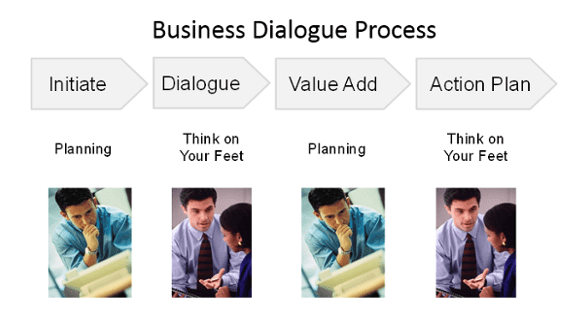
Forrester Research indicates that only about 1 in 8 executives consider their discussion with a sales person valuable.[1]
Engaging Executives with the Business Dialogue Process
Creating Value is the third step in the Business Dialogue process by which sales people and account managers can engage executives and become Trusted Business Partners to them.
Engaging executives is not only about creating an interesting conversation; it also involves providing something of value to the Executive in that conversation. Once the Executive has indicated that they are beginning to think of the Account Manager as a Trusted Business Partner, his or her expectation is that the Account Manager will provide something of value in the discussion. Unfortunately, this is often the point where the sales person slides back into ‘pitching products’. What Executives want at this point is not information about the supplier’s products or services. They also don’t want to hear the supplier’s Value Proposition; both of which are supplier-focused. What they want is something that helps them, something that is customer-focused.
What do Executives Value?
Sales people and account managers can provide Executives with three things that are both valuable and focused on the Executive’s needs.
1. Industry and market information and contacts
Executives want to be in touch with their peers in other companies to discuss common issues, compare experiences and knowledge, and benchmark results. Executives also want to connect with thought leaders and experts who can provide state-of-the-art thinking and solutions. Sales people who can provide these valuable connections not only create value for the Executive, they also demonstrate that they have special knowledge and connections to people who can help the Executive address their key issues, and demonstrate that they are willing to share the knowledge and connections without any direct connection to a sale. In other words, the sales person is being a Trusted Business Partner.
2. Information and data
Executives, like the rest of us, suffer from extreme data overload. What they value is someone who can provide information, industry studies, reports, etc. that they can apply to address their key challenges, issues and opportunities. Trusted Business Partner sales people and account managers are continuously ‘tagging’ articles, reports, etc. from the external market as well as their own internal sources that they believe will help their customers address their key issues.
3. Advice and insights
Once the sales person has established themself as a Trusted Business Partner, they can offer advice and insights. Offering advice and insights needs to be done carefully. As Tim Riesterer of Corporate Visions points out in his article Create Insight Without Merely Delivering Factoids, “Sharing facts that simply corroborate something someone already knows is not insight.”
An insight may take an existing fact already known to the executive and help them think about it in a different way, one that can lead to a solution they hadn’t thought of. For example, the Chief Nursing Officer at a community hospital knew that the high level of turnover among nurses was causing significant problems with providing quality care for patients and costing a lot of money in recruiting and training replacement nurses. When the account manager for the hospital services supplier suggested that the root cause of turnover was the amount of time nurses spent on non-nursing activities (and provided supporting data on nurse satisfaction), the insights led to an entirely new approach to addressing the problem.
Sales people and account managers need to keep in mind that the valuable connections, information and data, and advice and insights they provide in discussions with Executives need to meet two criteria.
First, they need to be credible. As one of our clients said, ‘If an account manager is going to give advice to an Executive, they’d better be right.’ Backing up advice and insights with data and personal experience is critical for credibility.
Second, the connection, new information, advice and insights also need to be compelling. The Executive needs to believe that the contact, information, etc. being offered by the sales person will make a difference in addressing their key issues.
Determining what executives will find valuable in a Business Dialogue is one of the steps that requires careful planning in the form of research to find new information, insights and potential connections. However, these value-adding inputs often come from the account manager’s continuous scanning of the external environment and their own organization’s internal information. The key factor is the attitude of the account manager; is he or she thinking, ‘How can I sell something?’ or ‘How can I help my customer improve their business?’
[1] Scott Santucci. Technology Buyer Insight Study: Are Salespeople Prepared For Executive Conversations?, 2010. Forrester Research, Inc.

